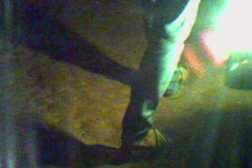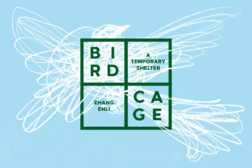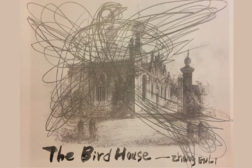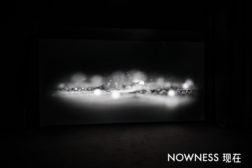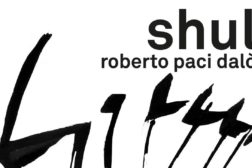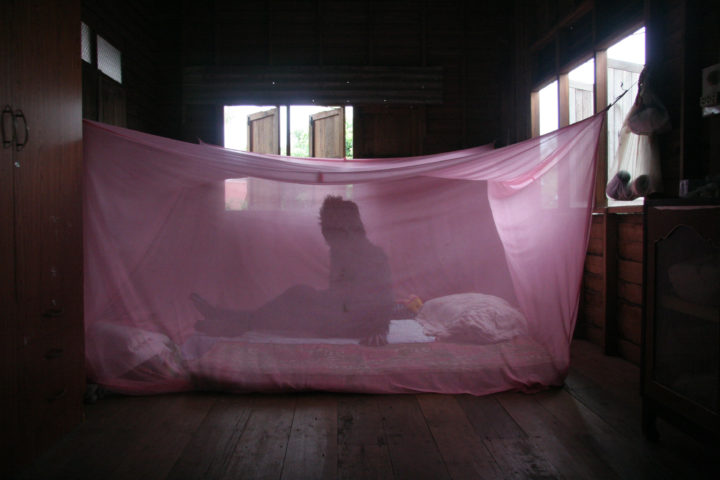
Apichatpong Weerasethakul and Rirkrit Tiravanija at MAXXI
Apichatpong Weerasethakul and Rirkrit Tiravanija at MAXXI
In occasion of the Videoart Week for Videocittà, a presentation of several short movies by the two artists is followed by a conversation between the curator Davide Quadrio and Rirkrit Tiravanjia to disclose the undercurrent complexity of the two artists’ poetics.
Screening program “Focus Thailand” Programme
Time: 2019 November 22
Venue: MAXXI Rome, Via Guido Reni, 4A, 00196 Roma RM
11:00-19:00, screening at Videogallery
Apichatpong Weerasethakul, Rirkrit Tiravanija
19:00-21:00, art talk, at Auditorium,
Rirkrit Tiravanija, Davide Quadrio
Apichatpong Weerasethakul and Rirkrit Tiravanija come originally from Thailand and both of them are very much connected to this country although working in the international arena for few decades already. Davide Quadrio curator and art producer based in Asia for over two decades, lived in Bangkok from 2008-2011 doing research on contemporary art in Thailand and in the region that ended with a performative symposium and a publication called “The Making of Meeting.”
Bringing the two artists together opens a series of interesting questions about their poetics and way of working but also it is an extraordinary occasion to infiltrate in the intricate history of Thailand vs the globalized world, its socio-political situation and local and international challenges and ultimately bringing to Maxxi Museum a vision of Asia in a global context seldom seen in Italy.
Apichatpong Weerasethakul and Rirkrit Tiravanija are both bringing constant references to their country in the most critical way however from very distinctive points of observation. Apichatpong Weerasethakul still lives in Bangkok while Rirkrit Tiravanija has been based in NYC for decades now however often in Chiang Mai where contributed actively to create a dynamic local art scene (the Land Foundation is a powerful example).
Said that, their works, seemly so distant, are constantly referring to the complexity of Thailand and south East Asia (post-) colonial history. Despite both artists works come from different backgrounds and lives experiences, being Rirkrit Tiravanija a visual artist and Apichatpong Weerasethakul a film maker/director, both gradually became closer in their practice bridging film and visual art realms ultimately occupying a territory that expands their practice and creates a communality that made them working together in several projects in the past years and most recently at HIRSHHORN
NATIONAL MUSEUM OF MODERN ART .
The works presented in this occasion are short movies by Apichatpong Weerasethakul that span from 1997 to a seldom seen short movie that brought him to win the Palme d’Or prize, A Letter to Uncle Boonmee (Primitive project), 2009 and an abstract of 90’ by Rirkrit Tiravanija of the documentary he made few years back on John Giorno, just before he passed away, JG Reads, USA 2008, 16 mm transferred to video, 10 hours and 6 min.
Presenting a single although fragmented reportage of John Giorno the mythical bohemian figure, poet, musician, artist and devoted Buddhist together with short glimpses of the multifaceted production by Apichatpong Weerasethakul creates a narrative texture that allows many layers of reading their works.
Apichatpong Weerasethakul’s works have a simple, almost casual nature, seem in between documentaries, video journals… almost like handwritten notes where the relationship between the artists and the subjects filmed live in a space of a performance, a sight, a short day-dream. In this respect even though the theme of Tiravanijia’s film is centered on an artist from NYC, the sensibility and the attitude of the work are very similar and expand on the fragility of the human being, constantly reminding us of the basic rules of human existence, a real ode to the human relationships, their intrinsic values and power and ultimately well respond to all the short movies by Apichatpong Weerasethakul that oscillate between poetry and dream leaving the audience to fill the gaps of the unspoken, the ghosts and the fragmented images of unknown lands.
APICHATPONG WEERASETHAKUL
LIST OF SHORT FILMS – Program #3 (98 minutes)
1. Thirdworld, 1997, 16mm transferred to DCP, black and white, sound, 17 min
2. Empire, 2010, 35mm transferred to DCP, colour, sound, 2 min
3. My Mother’s Garden, 2007, DCP, colour, silent, 7 min
4. Ghost of Asia, collaboration with Christelle Lheureux, 2005, DCP, colour, sound, 9 min
5. Monsoon, 2011, phone camera and computer camera transferred to DCP, colour, sound, 3 min
6. Luminous People, 2007, Super 8 transferred to DCP, colour, sound, 15 min
7. Nimit, 2007, HD, colour, sound, 16 min
8. Blue, 2018, DCP, colour, sound, 12.16 min
9. A Letter to Uncle Boonmee (Primitive project), 2009, colour, sound, 18 min
BIO
Apichatpong grew up in Khon Kaen in north-eastern Thailand. He began making film and video shorts in 1994, and completed his first feature in 2000. He has also mounted exhibitions and installations in many countries since 1998. Often non-linear, with a strong sense of dislocation, his works deal with memory, subtly addressed personal politics and social issues. His art projects and feature films have won him widespread recognition and numerous festival prizes, including two prizes from the Cannes Film Festival. His film, Syndromes and a Century, completed in late 2006, was the first Thai film to be selected for competition at the Venice Film Festival. His 2009 project, Primitive, consists of a large-scale video installation, an artist’s book, and a feature film, Uncle Boonmee Who Can Recall His Past Lives. The film has won a Palme d’Or prize at the 63rd Cannes Film Festival in 2010, making it the first Southeast Asian film (and the 7th from Asia) to win the most prestigious award in the film world. In 2012, he is invited to participate in Documenta (13), one of the most well-known art exhibitions in Kassel, Germany. In 2016, a retrospective of his films was presented at Tate Modern, London. He’s developing a new film, Memoria, set in Colombia. Apichatpong currently works and lives in Chiang Mai, Thailand.
RIRKRIT TIRAVANIJA
Film screening:
90’ Extract from JG Reads, USA 2008, 16 mm transferred to video, 10 hours and 6 min.
BIO
Born in Buenos Aires, Argentina, the Thai artist Rirkrit Tiravanija is widely recognized as one of the most influential artists of his generation. His work defies media-based description, as his practice combines traditional object making, public and private performances, teaching, and other forms of public service and social action. Winner of the 2005 Hugo Boss Prize awarded by the Guggenheim Museum, Tiravanija was also awarded the Benesse by the Naoshima Contemporary Art Museum in Japan and the Smithsonian American Art Museum’s Lucelia Artist Award.
He has had exhibitions at the Museum of Modern Art in New York, Hirschhorn Smithsonian in Washington DC, National Gallery Singapore, the Guggenheim Museum of New York, the Reina Sofia museum in Madrid, Los Angeles County Museum of Art, Luma Foundation in Arles and at the Museum Boijmans Van Beuningen in Rotterdam that then was presented in Paris and London. Tiravanija is on the faculty of the School of the Arts at Columbia University, and is a founding member and curator of Utopia Station, a collective project of artists, art historians, and curators. Tiravanija is also President of an educational-ecological project known as The Land Foundation, located in Chiang Mai, Thailand, where he maintains his primary residence and studio.
DAVIDE QUADRIO
After having founded and directed, between 1998 and 2010, the BizArt Centre, the first non- profit artistic /creative laboratory in Shanghai, where he lived from 1994 till 2017, in 2007 Davide Quadrio created Arthub Asia, a dedicated platform to the production and promotion of contemporary Art, in Asia and in the world. In the ambit of these experiences has realized numerous exhibitions, educational projects and cultural exchange, encouraging relations between institutions of the world.
Work that earned him the inclusion in BizArt as a special project of Art and China after 1989: Theatre of the World at Guggenheim in New York, 2017. From 2005 to 2008, was artistic director of the Bund18 creative space in Shanghai, where he has curated the Chinese Edition of the exhibition dedicated to Vivienne Westwood from the Victoria & Albert Museum and the traveling one of Droog Design (Shanghai, Shenzhen, Beijing), as well as the solo exhibition of Olivo Barbieri during the Shanghai Biennale, the institution for which in 2012 he coordinated the ‘City Pavilions’ project. Among his most recent initiatives: The Retrospective Journeys Without Arrivals of Qiu Zhijie (Vanabbe Museum; Centre of Contempotary Arts of Geneve; Kunstalle Lund); the double solo exhibition by Zhang Enli and Christopher Doyle at the Aurora Museum of Shanghai; the personal exhibition of Paola Pivi Tulkus 1898-2018 (Castello di Rivoli; Witte de With; Frac Dijon); the retrospective of Yang Fudong for the Toronto Film Festival 2013; the solo show of Jompet at the Gervasuti Foundation of Venice during the Venice Biennale 2011. Curator of Aurora Museum of Shanghai from 2013 to 2016, from 2015 to 2016, he edited the pop –up edition of the journal Kaleidoscope Asia. From September 2017 resides in Milano.
Image courtesy of Kick the Machine Films
